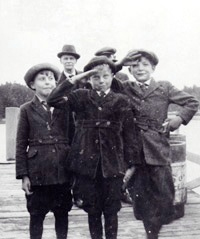Our History
1899 — The Beginning
 Maine Children’s Home for Little Wanderers first opened its doors on April 10, 1899, in Augusta. It was founded during a time in our history when there were many displaced children living on the streets or in abject poverty. Through the generosity and support of local residents, it became a safe haven for some of these children. The first year’s budget was $1,049, enough to feed, clothe and house 28 young children.
Maine Children’s Home for Little Wanderers first opened its doors on April 10, 1899, in Augusta. It was founded during a time in our history when there were many displaced children living on the streets or in abject poverty. Through the generosity and support of local residents, it became a safe haven for some of these children. The first year’s budget was $1,049, enough to feed, clothe and house 28 young children.
For some boys and girls, the home was just a temporary refuge. Parents who had suffered tragedy or financial loss would leave their children in its care while they got back on their feet, knowing they would be well looked-after. For other children, there was no home to return to. Recognizing a critical need, agency founders created a program to give these children an opportunity for a new life. Today, the Family Adoption Program represents the very heart of Maine Children’s Home.
1901 — The Maine Children's Home Society
In 1901, the home was officially incorporated as The Maine Children’s Home Society in Augusta. By 1915, the need for the orphanage lessened as the foster care movement began to grow. The home closed its doors, but the agency continued its adoption program and began to expand support services in response to the changing needs of local children.
1962 — The Maine Children's Home Society & The New England Home for Little Wanderers
On July 25, 1962, a merger of the state’s two longest-operating children’s agencies — The Maine Children’s Home Society and the Maine branch of The New England Home for Little Wanderers — was announced and Maine Children’s Home for Little Wanderers came into being. The primary branch was located in Waterville with programs including the adoption program, foster care, counseling, diagnostic study, case work with unmarried parents, and summer camp scholarships.
In the early 70s, expanding programs required more space, and the main branch moved to a larger facility on 34 Gilman Street in Waterville.
2001 — Maine Children's Home Moves to Current Campus in Waterville
In 2001, as the need for services continued to grow, Maine Children’s Home launched its first capital campaign in a century. Thanks to the generous lead support of Harold and Bibby Alfond, Maine Children’s Home was able to purchase the former Maine Criminal Justice Academy on 93 Silver Street in Waterville and significantly expand its level of service to better accommodate the critical needs of children and families.
2011 — Presented with Community Service Project of the Year Award
A Community Service Project of the Year Award is presented annually by the Mid-Maine Chamber of Commerce to an area non- or not-for-profit 501(c)3 or 501(c)6 that enhances the community, provides for the economic well-being of the area and encourages further development in the region. In 2011, the award was presented to The Maine Children’s Home for Little Wanderers in recognition of their recent Hague Accreditation that establishes safeguards to ensure intercountry adoption occurs in the best interest of children and families, and with the highest levels of integrity and ethics in practice. Only 204 adoption service providers in the United States have achieved Hague Accreditation or Approval through the Council on Accreditation for international adoption.
Today — We Continue to Expand Program Offerings and Strengthen Children & Families
Today, Maine Children’s Home is a multi-faceted organization that has grown and evolved to meet the challenges of changing times. In addition to the Family Adoption Program, now the longest-operating program of its kind in the state, it offers a host of other services, working closely with other agencies in Maine and beyond to fill gaps in service these agencies are not able to address.
Strengthening children and families is what Maine Children’s Home is all about. For information on how you can become part of Maine Children’s Home family, please contact us.
Our Mission
Maine Children’s Home builds and strengthens Maine families and their children, instilling hope for the future and a better quality of life.